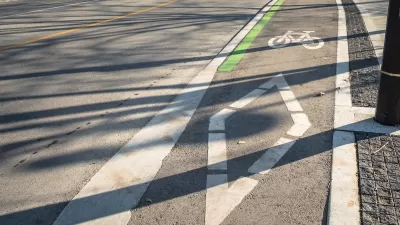In Washington D.C., Maryland, Virginia, North Carolina, and Alabama, the legal policy known as contributory negligence blocks cyclists from claiming damages if they're involved in a crash.

When it comes to cyclists sharing the road with cars, "most states abide by a policy of 'comparative fault' in the event of a crash. This standard holds that if a cyclist or pedestrian can claim less than 50 percent of responsibility for a dust-up, they're entitled to either a full insurance payment, or one commensurate with their level of negligence as determined by a jury."
However, as Eillie Anzilotti writes, "in Maryland, Virginia, North Carolina, Alabama, and Washington, D.C., that is not the case. That's because in those locales, the standard of contributory negligence has not been written out of the books, like it has been in the rest of the United States."
An anachronistic policy, contributory negligence states that if the victim is more than 1 percent responsible for an accident or injury, he or she cannot claim a recovery payment. Bruce Deming, a D.C.-area lawyer who often represents injured cyclists, say contributory negligence "originated in England in 1809 as a means to shield employers from having to compensate harmed members of their workforce." It has been repudiated by most U.S. jurists, and only remains on the books in four states and the capital.
In Washington, a measure to update the policy is having trouble getting through the city council "D.C.'s approach [...] would grant injured people the level of parity they're guaranteed in most of the rest of the country, and it shows the potential for contributory negligence to be struck down on a granular level in a way that the four other states could emulate."
FULL STORY: The Legal Policy That Makes Collisions Especially Harrowing for Cyclists

Planetizen Federal Action Tracker
A weekly monitor of how Trump’s orders and actions are impacting planners and planning in America.

Restaurant Patios Were a Pandemic Win — Why Were They so Hard to Keep?
Social distancing requirements and changes in travel patterns prompted cities to pilot new uses for street and sidewalk space. Then it got complicated.

Map: Where Senate Republicans Want to Sell Your Public Lands
For public land advocates, the Senate Republicans’ proposal to sell millions of acres of public land in the West is “the biggest fight of their careers.”

Maui's Vacation Rental Debate Turns Ugly
Verbal attacks, misinformation campaigns and fistfights plague a high-stakes debate to convert thousands of vacation rentals into long-term housing.

San Francisco Suspends Traffic Calming Amidst Record Deaths
Citing “a challenging fiscal landscape,” the city will cease the program on the heels of 42 traffic deaths, including 24 pedestrians.

California Homeless Arrests, Citations Spike After Ruling
An investigation reveals that anti-homeless actions increased up to 500% after Grants Pass v. Johnson — even in cities claiming no policy change.
Urban Design for Planners 1: Software Tools
This six-course series explores essential urban design concepts using open source software and equips planners with the tools they need to participate fully in the urban design process.
Planning for Universal Design
Learn the tools for implementing Universal Design in planning regulations.
Heyer Gruel & Associates PA
JM Goldson LLC
Custer County Colorado
City of Camden Redevelopment Agency
City of Astoria
Transportation Research & Education Center (TREC) at Portland State University
Camden Redevelopment Agency
City of Claremont
Municipality of Princeton (NJ)




























